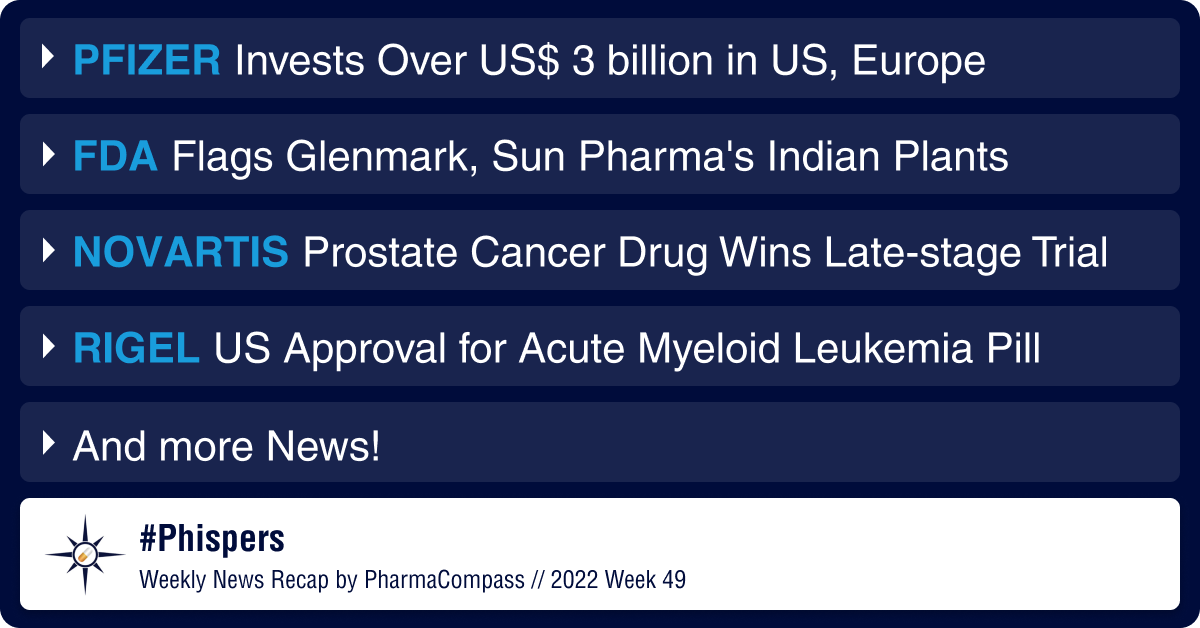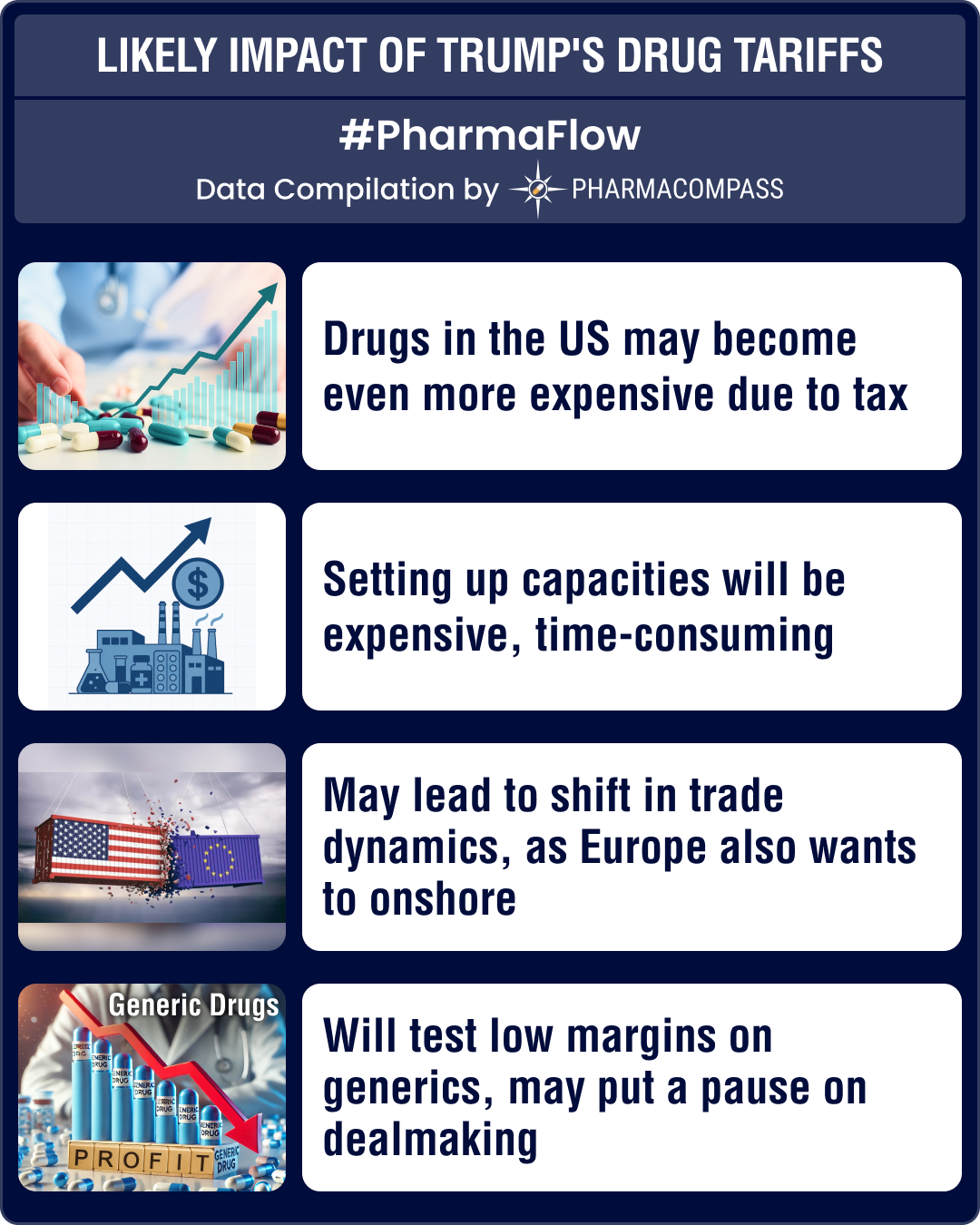
By PharmaCompass
2022-12-08
Impressions: 2,851
Cash-rich Pfizer has announced plans to invest over US$ 2.5 billion at its drug manufacturing plants in Belgium and Ireland. In the US, the company will invest another US$ 750 million to upgrade its manufacturing facility in Kalamazoo, Michigan.
In regulatory news, FDA has issued a warning letter to Glenmark’s manufacturing facility at Colvale in Goa (India). Sun Pharma said its facility in Halol (Gujarat, India) has been put on FDA’s import alert. And French drug agency ANSM has said it is being investigated on suspicion of issuing misleading information regarding Merck KGaA’s thyroid drug Levothyrox.
In drug trials news, Novartis’ prostate cancer drug Pluvicto has registered a win in a late-stage trial, helping patients with previously treated PSMA-positive metastatic castration-resistant prostate cancer (mCRPC) live longer without their disease progressing. GSK’s Jemperli has succeeded in a late-stage trial in endometrial cancer. Merck is testing two new formulations of its blockbuster drug Keytruda that can be injected subcutaneously. Prometheus Biosciences’ experimental drug candidate has succeeded in a pair of mid-stage clinical trials in inflammatory bowel diseases. And, a combination of Keytruda and Mirati’s adagrasib has succeeded in a lung cancer trial.
The US Food and Drug Administration (FDA) has approved Rigel Pharmaceuticals’ oral medicine – Rezlidhia – for the treatment of relapsed or refractory acute myeloid leukemia in patients with a susceptible genetic mutation.
The European Medicines Agency (EMA) has recommended that drugs containing pholcodine be withdrawn from Europe after its expert panel said they pose a significant risk of allergic reaction to neuromuscular blocking agents that are used in general anesthesia. And over a dozen Indonesian families, whose children died or fell ill after consuming cough syrups, have sued the government and drugmakers.
In deals, US-based Summit Therapeutics has struck a potential US$ 5 billion deal with Chinese drugmaker Akeso to license the latter’s experimental treatment for non-small cell lung cancer (NSCLC). AbbVie has also entered into a potential US$ 295 million licensing deal with HotSpot Therapeutics to license a program designed to treat autoimmune diseases.
Indian drugmakers are once again in FDA’s firing line as Glenmark Pharmaceuticals and Sun Pharmaceutical Industries faced regulatory action.
Sun Pharma announced this week that the FDA has listed its facility in Halol (Gujarat) under an import alert. This means that all future shipments of products made at Halol can be refused admission to the US market until the facility becomes compliant with the FDA’s current good manufacturing practice standards.
The FDA has issued a warning letter to generics drugmaker Glenmark Pharmaceuticals’ manufacturing facility at Colvale in the Indian state of Goa. The agency had issued a Form 483 with five observations to the facility after conducting an inspection in May this year.
With eye on future drug launches, Pfizer invests over US$ 3 billion in US, Europe
Cash-rich Pfizer has announced a flurry of investments at its US and European manufacturing facilities. Last week, the New York-based pharma said it will invest over US$ 2.5 billion at its drug manufacturing plants in Belgium and Ireland, to help it launch new products and arrest the loss in revenue caused by a decline in sales of its Covid-19 products and the loss of patents for its existing products.
The drugmaker will spend over €1.2 billion (US$ 1.26 billion) to expand its manufacturing site in Puurs, Belgium. And it plans to invest an equal amount to “significantly expand” its manufacturing site at Grange Castle in Dublin, Ireland. While some work is already underway at the Puurs site, the remaining projects are slated to begin early next year.
Pfizer expects to start building a new facility at its Dublin site in 2024 and complete the work in 2027. The expansion will double the capacity for biological drug substance manufacturing at the site and add between 400 and 500 new jobs by 2027. This is the company’s largest expansion investment in Ireland till date.
In the US, the company has decided to invest another US$ 750 million to upgrade its manufacturing facility in Kalamazoo, Michigan – the site where the company first mass produced its Covid-19 vaccine. The investment will boost the plant’s manufacturing of sterile injectable medications and create 300 new jobs.
Meanwhile, German pharma giant Bayer said it will invest US$ 43.6 million to expand its facility in Myerstown, Pennsylvania. Bayer plans to complete the expansion of the site, which produces most of its OTC brands, by 2025 and add around 50 to 75 jobs.
FDA grants priority review to Pfizer’s RSV vaccine for use in older patients: The FDA has agreed to review Pfizer’s respiratory syncytial virus (RSV) vaccine candidate, RSVpreF, on priority. The New York-based drugmaker has sought approval for use of its shot in adults aged 60 years and older. The agency will announce its decision by May 2023. If approved, it could become the first RSV vaccine in the US for older adults.
Meanwhile Pfizer and BioNTech have applied to the FDA for emergency use authorization of its Omicron-adapted Covid-19 vaccine booster for children between six months through four years.Novartis’ Pluvicto shows survival benefits in late-stage prostate cancer trial
Novartis’ prostate cancer drug Pluvicto has registered a win in a late-stage trial, helping patients with previously treated PSMA-positive metastatic castration-resistant prostate cancer (mCRPC) live longer without their disease progressing. Pluvicto also helped halt the progression of the disease in trial patients who had earlier received androgen-receptor pathway inhibitor (ARPI) therapy but didn’t get taxane-based chemotherapy.
The drugmaker plans to share detailed results at a future medical meeting and discuss the data with the FDA next year for a potential approval. In March, the FDA had approved the drug for patients with mCRPC after they’ve received both ARPI and chemo.
Prometheus’ drug succeeds in IBD trials: San Diego-based Prometheus Biosciences’ experimental drug candidate has succeeded in a pair of mid-stage clinical trials in inflammatory bowel diseases. The company said its lead drug candidate – PRA023 – met the endpoints in a phase 2 study in patients with moderate-to-severely active ulcerative colitis who had failed conventional or advanced therapy — around 26.5 percent of the patients achieved clinical remission at week 12 compared with only 1.5 percent of patients on placebo. In the second study focused on moderate-to-severely active Crohn’s disease, Prometheus said 26 percent of the patients achieved endoscopic response. Another 49.1 percent of patients achieved clinical remission.
GSK’s Jemperli wins late-stage trial in endometrial cancer: Recently, GSK said its oncology drug Jemperli (dostarlimab), when used in combination with chemotherapy, shrank tumors in 46 percent of newly diagnosed patients with metastatic non-squamous NSCLC as compared to 37 percent of patients for Keytruda’s chemo combo arm. Now, the British pharma has said a Jemperli plus chemo combo helped patients with primary advanced or recurrent endometrial cancer live longer without their disease progressing when compared with chemo alone. In the phase 3 trial, the drug helped patients across subgroups as well as the overall study population. GSK plans to make regulatory submissions for a first-line endometrial cancer indication in the first half of 2023.
Amgen’s obesity drug shows durability signs in phase 1 trial: Amgen’s experimental injectable obesity drug – AMG133 – has shown promising durability trends in a small phase 1 trial. Data from the trial found that patients maintained their weight loss for 70 days after receiving the highest dose of the drug. At 150 days after the last dose, patients lost 11.2 percent below the original weight at the start of the trial. Buoyed by the trial’s success, the drugmaker is now planning to initiate a larger mid-stage study early next year.
Summit inks up to US$ 5 billion lung cancer deal with China’s Akeso
US-based Summit Therapeutics has struck a potential US$ 5 billion deal with Chinese drugmaker Akeso to license the latter’s experimental treatment for NSCLC. As part of the deal, Summit will make an upfront payment of US$ 500 million to Akeso. The US-based drugmaker has also promised to pay Akeso up to US$ 4.5 billion in regulatory and commercial milestones along with royalties on net sales. The deal will give Summit the rights to develop and commercialize Akeso’s ivonescimab in the US, Canada, Europe and Japan, while Akeso will retain the rights for the rest of the world, including China.
AbbVie signs licensing deal with HotSpot: AbbVie has entered into a potential US$ 295 million collaboration with US-based drugmaker HotSpot Therapeutics to license a program to treat autoimmune diseases. AbbVie will hand over US$ 40 million upfront to HotSpot and has promised the biotech up to US$ 295 million in “option fees” and R&D milestones. In return, HotSpot will use its drug discovery platform, Smart Allostery, to develop one of the first small-molecule IRF5 inhibitors as a treatment for cancer and autoimmune diseases.
EMA advises against use of cough suppressants containing pholcodine
The EMA has recommended that drugs containing pholcodine be withdrawn from the European market after its panel of experts said they pose a significant risk of an allergic reaction to neuromuscular blocking agents that are used in general anesthesia. The Coordination Group for Mutual Recognition and Decentralized Procedures – Human (CMDh) will take a final decision. Pholcodine is an opioid-based medicine used to treat dry cough, cold and flu symptoms.
Indonesians sue govt, drugmakers over cough syrup deaths: More than a dozen Indonesian families, whose children died or fell ill after consuming cough syrups linked to acute kidney injury, have sued the Indonesian government and companies for allowing these products in the country. The class-action suit mentions Indonesia’s food and drugs agency (BPOM), the health ministry and seven companies implicated in selling the syrups. Each family has demanded two billion rupiah (US$ 129,575) as compensation for every child’s death and half of that amount for organ damage. Around 200 children have died of acute kidney injury in Indonesia this year, prompting the government to ban some syrup medicines and launch an investigation.
Merck carries out trials on two versions of Keytruda shot to retain patent edge
Merck is carrying out clinical trials of its blockbuster cancer immunotherapy — Keytruda — that can be injected under the skin. The drugmaker is testing at least two versions of the drug with the hope that a new formulation will allow it to retain the drug’s patent edge and protect it from competition. The key patents of this blockbuster drug will start expiring in 2028. Currently, patients receive intravenous drips of the drug once every three or six weeks.
Keytruda and Mirati’s adagrasib combo succeeds in lung cancer trial: Mirati Therapeutics’ experimental drug adagrasib, when paired with Merck’s Keytruda, helped around half of previously untreated metastatic lung cancer patients. In a phase 2 trial, the drug combo shrank tumors in 49 percent of 53 patients with newly diagnosed KRAS G12C-mutated NSCLC. The combo also showed relatively low side effects. Based on the results, Mirati plans to launch a phase 3 trial in front-line NSCLC soon.FDA approves Rigel’s oral drug to treat acute myeloid leukemia
The FDA has approved Rigel Pharmaceuticals’ oral medicine – Rezlidhia – for the treatment of relapsed or refractory acute myeloid leukemia in patients with a susceptible genetic mutation. The pill’s approval is based on data from a mid-stage study that showed a 35 percent rate for complete remission of the cancer with a complete or partial recovery in blood count. Rezlidhia is Rigel’s second treatment to get FDA approval. The drugmaker had acquired the drug through a licensing agreement with Forma Therapeutics for an upfront payment of US$ 2 million.
ANSM gets probed for providing misleading information on Merck KGaA’s thyroid drug
French drug agency ANSM is being investigated on suspicion of issuing misleading information regarding German drugmaker Merck KGaA’s thyroid drug Levothyrox. In 2017, Merck KGaA’s move to remove lactose from the drug had resulted in side effects such as memory loss, weight gain and palpitations in patients.
“The ANSM has never denied the difficulties encountered by some patients during the changeover to the new Levothyrox formula,” ANSM said, adding that it is contesting the provisional charges.
In March, the country’s top court had upheld a ruling that had ordered Merck KGaA to pay over US$ 3.6 million to more than 3,000 people to settle a long-running dispute over the reformulation of Levothyrox.The PharmaCompass Newsletter – Sign Up, Stay Ahead
Feedback, help us to improve. Click here
Image Credit : Phisper Infographic by SCORR MARKETING & PharmaCompass license under CC BY 2.0
“ The article is based on the information available in public and which the author believes to be true. The author is not disseminating any information, which the author believes or knows, is confidential or in conflict with the privacy of any person. The views expressed or information supplied through this article is mere opinion and observation of the author. The author does not intend to defame, insult or, cause loss or damage to anyone, in any manner, through this article.”








